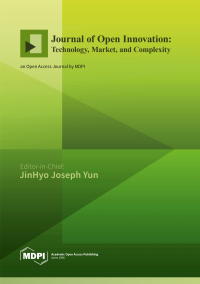Big Data Research for Open Innovation
A special issue of Journal of Open Innovation: Technology, Market, and Complexity (ISSN 2199-8531).
Deadline for manuscript submissions: closed (28 February 2021) | Viewed by 19213
Special Issue Editors
Interests: digital footprint; big data; innovation systems; internet economics
Special Issue Information
Dear Colleagues,
Big data approaches in an open innovation environment may enable the flows of knowledge and external cooperation at many different levels. The increasing availability of open and big data sources of information has drawn attention to the different research methods that can be used to extract useful information and support the creation of innovative solutions. This Special Issue will present some of the most recent advances in the application of big data-related research methods to different fields of social sciences. Suitable topics include, but are not limited to, the following:
Open and big data sources in economics and social sciences:
- Google trends and search engine data;
- Web scraping;
- Social media and public opinion mining;
- Geospatial and mobile phone data;
Big data solutions in innovation systems:
- Sentiment analysis;
- Internet econometrics;
- Machine learning econometrics;
- Information quality and assessment;
- Crowdsourcing;
Internet and big data applications to innovation systems:
- Official statistics;
- Tourism forecasting;
- Business analytics with social media;
- Social behavior and mobility patterns;
- Consumer behavior, eWOM, and social media marketing;
- Politics and social media;
- Bibliometrics and sciencetometrics.
Prof. Dr. Josep Domenech
Prof. Dr. María Rosalía Vicente
Guest Editors
Manuscript Submission Information
Manuscripts should be submitted online at www.mdpi.com by registering and logging in to this website. Once you are registered, click here to go to the submission form. Manuscripts can be submitted until the deadline. All submissions that pass pre-check are peer-reviewed. Accepted papers will be published continuously in the journal (as soon as accepted) and will be listed together on the special issue website. Research articles, review articles as well as short communications are invited. For planned papers, a title and short abstract (about 100 words) can be sent to the Editorial Office for announcement on this website.
Submitted manuscripts should not have been published previously, nor be under consideration for publication elsewhere (except conference proceedings papers). All manuscripts are thoroughly refereed through a single-blind peer-review process. A guide for authors and other relevant information for submission of manuscripts is available on the Instructions for Authors page. Journal of Open Innovation: Technology, Market, and Complexity is an international peer-reviewed open access quarterly journal published by MDPI.
Please visit the Instructions for Authors page before submitting a manuscript. The Article Processing Charge (APC) for publication in this open access journal is 800 CHF (Swiss Francs). Submitted papers should be well formatted and use good English. Authors may use MDPI's English editing service prior to publication or during author revisions.
Keywords
- big data
- open innovation
- open data
- social media
- webscraping
- machine learning




